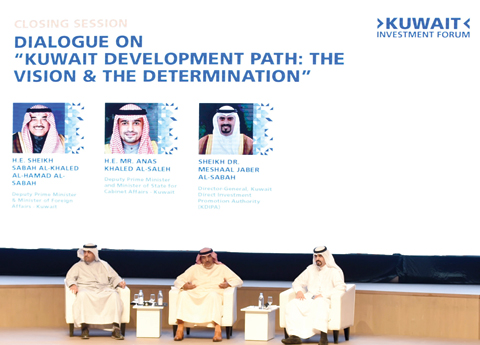Interactive session held on second day of Kuwait Investment Forum
 KUWAIT: (From left) Cabinet Affairs Minister Anas Al-Saleh, Foreign Minister Sheikh Sabah Al-Khaled Al-Hamad Al-Sabah, and KDIPA Director General Sheikh Meshaal Jaber Al-Ahmad Al-Sabah attend a session yesterday held as part of the Kuwait Investment Forum. - Photo by Yasser Al-Zayyat
KUWAIT: (From left) Cabinet Affairs Minister Anas Al-Saleh, Foreign Minister Sheikh Sabah Al-Khaled Al-Hamad Al-Sabah, and KDIPA Director General Sheikh Meshaal Jaber Al-Ahmad Al-Sabah attend a session yesterday held as part of the Kuwait Investment Forum. - Photo by Yasser Al-ZayyatKUWAIT: An interactive session on the second day of the Kuwait Investment Forum (KIF 2018) was held at the Jaber Al-Ahmad Cultural Center (JACC) highlighting the focus of the country to drive digital transformation. Speakers presented investment opportunities in diverse sectors, ranging from information and communications technology (ICT) projects, new city developments, modern oil industries, road and transport projects, industrial development, tourism and sports facilities.
Addressing delegates, Dr Adnan Shihab-Eldin - Director-General, Kuwait Foundation for the Advancement of Sciences (KFAS), said: "There is an approved plan to increase government spending for science, technology and innovation to over one percent of the total GDP from 0.3 percent - closer to the global average, and set up a national research and development council, which will also strengthen the role of the private sector to improve their products, processes and services. The human potential and support of the government continue to promote these initiatives to building a stronger innovation ecosystem for the welfare of the country and its people."
During a session on 'Investment Opportunities: Lucrative Options in Dynamic Sectors,' Dr Khaled Mahdi, Secretary-General of the Supreme Council for Planning and Development said: "The New Kuwait plan will address all concerns regarding our growth strategy. We have tech-savvy young human capital with 82 percent mobile penetration, strong ratings and the fundamentals for a prosperous future. We had a very structured development plan starting with legislative reforms from 2010 to 2015, infrastructure building, increased private sector engagement, building a knowledge-based economy and building a 'New Kuwait'. One of our key priorities must be to address the gaps relating to human capital development to prepare our nation for the Fourth Industrial Revolution. We are also focused on strengthening our SME sector, with the national fund not serving now as a funding agency but as an incubator. We offer several incentives for youth to drive their entrepreneurship, including commercial sabbaticals."
Kuwait Airport
Ebru Ozdemir, Chairwoman of Limak in Turkey, said work on the Kuwait International Airport Terminal Phase 2, which the Turkish company is building, is progressing as per schedule, with several construction milestones already achieved. She said the forward-looking and open-development approach of Kuwait is a driver for inward investments, adding her company will work with Kuwaiti entities and investors to explore opportunities in new markets.
In the fourth session entitled 'Financing for Sustainable Development', Timothy Keating, Executive Vice President of Government Operations of Boeing, said: "For more than 50 years, Boeing has partnered with Kuwait, providing aircraft to meet both the commercial and military needs of the country. We have strong relationships with Kuwait Airways and the Aviation Lease and Finance Company (ALAFCO), and well as Kuwait's armed forces. Human capital development is a key focus for Kuwait, as it is for many countries around the world, and frankly every organization including Boeing. This is why we believe the private sector has a responsibility to contribute by working with the community to ensure a qualified workforce. I am proud to say that Boeing has supported educational programs in Kuwait since 2010."
He revealed Boeing's plans to open its first official office in Kuwait this year. "The Middle East will require 3,350 new airplanes worth about $730 billion by 2035. This means the region will need approximately 63,000 pilots and 66,000 technicians, some of whom could be trained here in Kuwait in the near future. We believe Kuwait with its Vision 2035 and the creation of KDIPA (Kuwait Direct Investment Promotion Authority) is targeting all the critical areas that make a place attractive to foreign investment."
Achievements
In the closing session on "Kuwait Development Path: The Vision and the Determination", Sheikh Meshaal Jaber Al-Ahmad Al-Sabah, Director General of KDIPA, provided an overview of the achievements made by Kuwait in the past year. He said the country has achieved significant milestones in global rankings, improving from a rank of 90 to 59 in wastefulness in government spending, from 75 to 62 in quality of market regulation and from 108 to 90 in burden of government regulation, as per the Global Competitiveness Report 2017/18.
He said Kuwait also improved its ranking in the World Bank's Ease of Doing Business report from 102 to 96, while Moody's has rated the country's credit rating at AA2 stable, "guaranteeing investors their rights and giving the private sector a stronger role in operations and project implementation".
Sheikh Sabah Al-Khaled Al-Hamad Al-Sabah, Deputy Prime Minister and Minister of Foreign Affairs, praised the effort of KDIPA, and the Kuwait Chamber of Commerce and Industry (KCCI), adding that this forum will boost Kuwait's economy and improve its business environment. Meanwhile, Anas Khaled Al-Saleh, Deputy Prime Minister and Minister of State for Cabinet Affairs, said the government is not only interested in the economy and investments but also in investing in human assets. "There will be a workshop in the ministry of education to discuss a new creative curriculum and this is our priority," he said.
By Faten Omar










